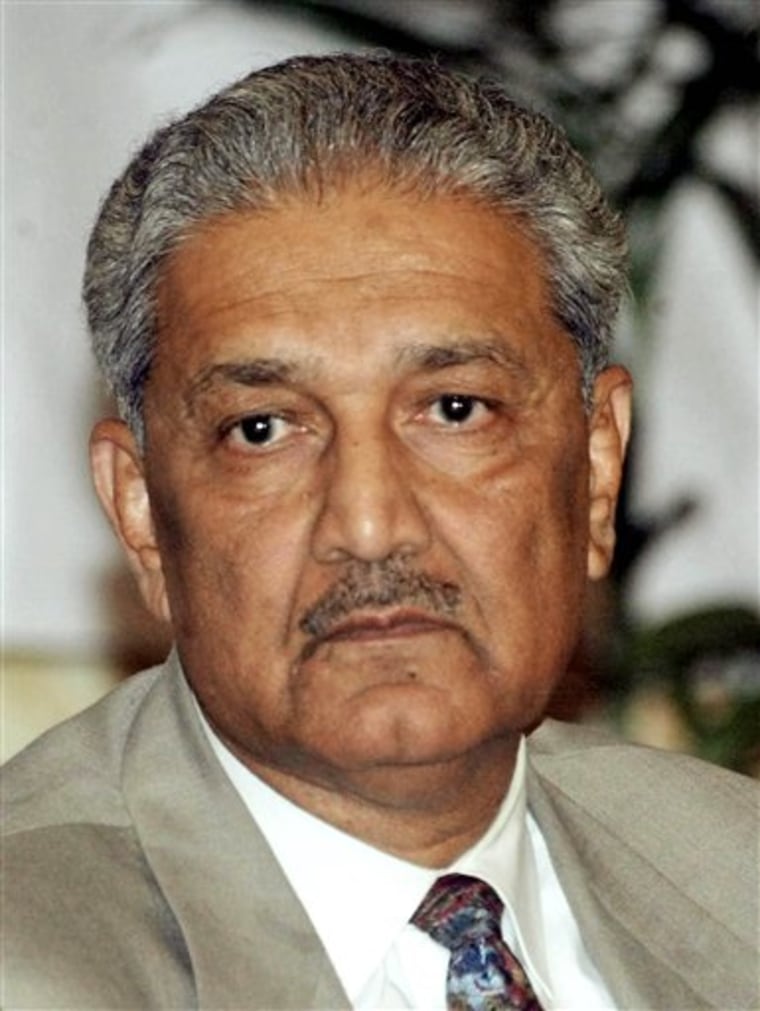The disgraced architect of Pakistan's nuclear program said Friday that it provided centrifuges to North Korea in a 2000 shipment supervised by the army under President Pervez Musharraf.
Abdul Qadeer Khan, who remains a national hero despite confessing four years ago to heading a clandestine proliferation network, told The Associated Press in a telephone interview that the uranium enrichment equipment was sent from Pakistan in a North Korean plane that was loaded under the supervision of Pakistani security officials.
His claims contradict his 2004 confession that he was solely responsible for spreading nuclear technology to Iran, North Korea and Libya — and Pakistan's repeated denials its army or government knew about Khan's nuclear proliferation activities.
Khan said the army had "complete knowledge" of the shipment of used P-1 centrifuges to North Korea and that it must have been sent with the consent of Musharraf, the then-army chief who took power in a 1999 coup.
"It was a North Korean plane, and the army had complete knowledge about it and the equipment," Khan said. "It must have gone with his (Musharraf's) consent."
Controversial claims
Khan's allegations, reported earlier Friday by the Japanese news agency, Kyodo, are his most controversial yet and could prove deeply embarrassing for both the army and Musharraf, a key ally in the U.S.-led war on terror.
Musharraf's spokesman, Rashid Qureshi, rejected Khan's claims.
"I can say with full confidence that it is all lies and false statements," he said.
Army and Foreign Ministry spokesmen declined immediate comment.
Khan is regarded as a hero by many in Pakistan for his key role in the program that gave it the Islamic world's first nuclear bomb in 1998, seen as a deterrent against historic archrival India.
Musharraf pardons Khan
After his 2004 confession and televised statement of contrition, Khan was pardoned by Musharraf but has been kept under virtual house arrest at his spacious villa in Islamabad.
Since a new civilian government took power after February elections, eclipsing Musharraf, the retired scientist has increasingly spoken out in the media.
Asked why he had taken sole responsibility for the nuclear proliferation, Khan said he had been persuaded that it was in the national interest by friends including Chaudhry Shujaat Hussain, a key figure in the-then ruling party.
Khan said that in return he had been promised complete freedom, but "those promises were not honored."
Hussain could not immediately be reached for comment.
Khan also said that he had traveled to North Korea in 1999 with a Pakistan army general to buy shoulder-launched missiles from Pyongyang.
Khan's wife this week said she was challenging her husband's detention in court. The Khans have appointed an attorney to petition the Islamabad High Court for an end to the restrictions on his movements and for his freedom to speak to the media.
On Friday, a lawyer for Khan alleged that listening devices had been planted in the scientist's tightly guarded home.
Khan's network
Pakistan says it has taken extra steps to tighten its control of its nuclear assets since Khan's network was uncovered in late 2003. It says a foolproof command and control system is in place so its nuclear assets cannot get into the wrong hands.
But Khan's bald accusation that the military establishment was in the know adds to widespread skepticism that he could have exported nuclear technology under the radar of Pakistan's pervasive security apparatus.
"No flight, no equipment could go outside without the clearance from the ISI and SPD and they used to be at the airport, not me," Khan said, referring to the powerful Inter-Services Intelligence agency and the Strategic Planning Division that manages Pakistan's nuclear arsenal.
Political and military analyst Talat Masood said it made sense that the effort was coordinated by more than one person.
"If the requirement of an aircraft was there, the requirement of dealing with another country was there, it's not just one man who could have done it," Masood said. "Whether they were doing it individually or collectively or as a state policy or informally — that needs to be determined."
Pakistan has refused to allow outsiders to question Khan, including from the U.N.'s International Atomic Energy Agency, but says it has shared the findings of its own questioning of Khan.
Khan said he had visited North Korea twice, in 1994, and then in 1999, when he was sent to procure missiles during the so-called Kargil conflict when Pakistan clashed with India in disputed Kashmir.
Khan told Kyodo that the missiles were shoulder-fired SA 15 missiles.
Khan told AP that Musharraf had requested him to make the second trip and he did so accompanied on a special plane by an army general, Iftikhar Hussain Shah.
"Since I had good relations with them (North Korea) and they respected me, they gave us 200 missiles after getting them from their army and those missiles were loaded in the same plane," Khan said.
He said after the Kargil conflict ended, Pakistan's government tried to return the missiles to North Korea to avoid paying for them but following his intervention, paid for and kept the weapons.
Khan was bitter in his criticism of Musharraf and confident in his own high standing among Pakistanis despite his 2004 confession.
"People still respect me, and if any one has any doubts and thinks himself more popular, he should go with me to Aabpara or Raja Bazar (two markets in Islamabad and nearby Rawalpindi)," he said.
Comparing the reception he would get to that which would be accorded Musharraf, Khan said: "You can cut my nose if his (Musharraf's) clothes remained untorn."
